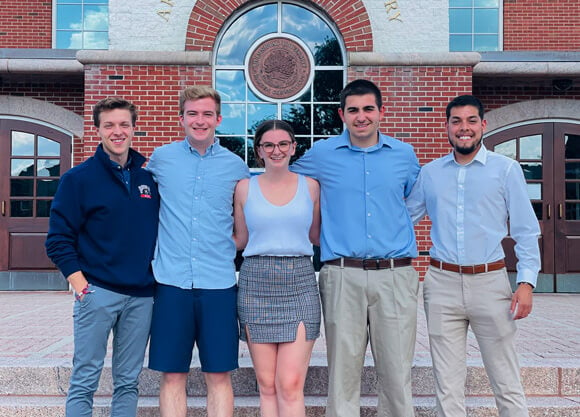
Quinnipiac launches student-led pre-med ambassadors program
August 30, 2022

August 30, 2022

Launching this fall, the pre-med ambassadors program aims to offer support, advising and resources to undergraduate pre-medical students as they progress through their undergraduate degree and prepare for medical school or other clinical doctorates of interest. A diverse group of student ambassadors will serve as mentors for early-college undergraduate students interested in medicine or other healthcare careers.
“We’re not striving to shape all students into a singular mold, but rather we hope to uncover their drives, goals and interests in such a way that us ambassadors can offer guidance, resources and support,” said Surace, pictured second from the right with other student ambassadors. “We’ll also assist our fellow students in strategizing to obtain healthcare experience, community service, volunteer or research opportunities.”
Surace went to Anna Gilmore, director of pre-health advising, last July with his idea, hoping to create an avenue of personalized support and resource guidance for students from others who have “been there, done that” as a means of reducing stress. Together, they worked to develop a policy, handbook, training manual and application process, and recruited four additional pre-med ambassadors for the inaugural year.
“A program like this is something I have wanted to do for years but have not had the capacity to implement on my own,” said Gilmore. “Kevin really illustrates the qualities of a good leader – he was willing to roll up his sleeves, get creative and work hard to make things happen.”
Since the program is student-led, the current ambassadors are working to recruit more students to join the organization.
The pre-med population at Quinnipiac is progressively growing, and much of the one-on-one advising begins in the one to two years prior to applying to medical school or other clinical-doctorate programs, Surace said.
He said he anticipates the program will be extremely beneficial to those who are early in their undergraduate career as the experiences of the current ambassadors are incredibly diverse.
“One of my goals entering Quinnipiac was to make a lasting, meaningful impression on the university,” said Surace. “My hope is that the pre-med ambassadors program does exactly that.”
Quinnipiac Today is your source for what's happening throughout #BobcatNation. Sign up for our weekly email newsletter to be among the first to know about news, events and members of our Bobcat family who are making a positive difference in our world.
Sign Up Now